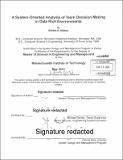A system-oriented analysis of team decision making in data rich environments
Author(s)
Nilekar, Shirish K
DownloadFull printable version (19.06Mb)
Other Contributors
System Design and Management Program.
Advisor
Michael Davies.
Terms of use
Metadata
Show full item recordAbstract
The information processing view of organizations [1] and subsequent works highlight the primary role of information processing in the effective functioning of markets and organizations. With the current wave of "big data" and related technologies, data-oriented decision making is being widely discussed [2] as a means of using this vast amount of available data for better decisions which can lead to improved business results. The focus of many of these studies is at the organization level. However, decisions are made by teams of individuals and this is a complex socio-technical process. The quality of a decision depends on many factors including technical capabilities for data analysis and human factors like team dynamics, cognitive capabilities of the individuals and the team. In this thesis, we developed a systems theory based framework for decision making and identified four socio technical factors viz., data analytics, data sensing, power distribution, and conflict level which affect the quality of decisions made by teams. We then conducted "thought experiments" to investigate the relative contribution of each of these factors to the quality of decisions. Our experiments and subsequent analyses show that while improved data analytics does result in better decisions, human factors have an out-sized contribution to the quality of decisions, even in data rich environments. Moreover, when the human factors in a team improve, the predictability of the positive impacts due to improvements in technical capabilities of the team also increases.
Description
Thesis: S.M. in Engineering and Management, Massachusetts Institute of Technology, Engineering Systems Division, System Design and Management Program, 2013. Cataloged from PDF version of thesis. Includes bibliographical references (pages 78-80).
Date issued
2013Department
System Design and Management Program.; Massachusetts Institute of Technology. Engineering Systems DivisionPublisher
Massachusetts Institute of Technology
Keywords
Engineering Systems Division., System Design and Management Program.